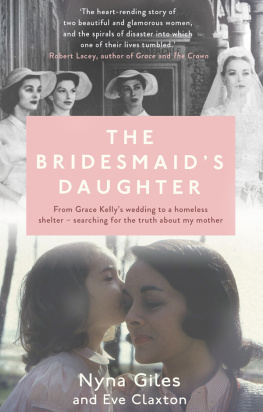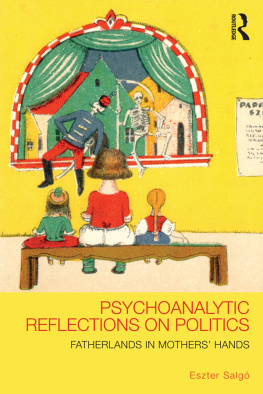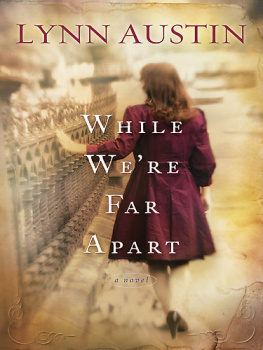
Attila Bartis
TRANQUILITY
Translated from the Hungarian by Imre Goldstein
archipelago books
English translation 2008 Imre Goldstein
Originally published as A nyugalom by Magvet, 2001 Budapest
Copyright 2001 Bartis Attila
First Archipelago Books Edition, 2008
All rights reserved. No part of this book may be reproduced
or retransmitted in any form without prior
written permission of the publisher.
Library of Congress Cataloging-in-Publication Data
Bartis, Attila.
[A nyugalom. English.]
Tranquility / by Attila Bartis ; translated from the Hungarian by Imre Goldstein.
p. ; cm.
ISBN 978-0-9800330-0-7
I. Goldshtain, Imri, 1938 II. Title.
PH3213.B2976N9413 2008
894.51134 dc22 2008015344
Archipelago Books
232 Third St. #A111
Brooklyn, NY 11215
www.archipelagobooks.org
Distributed by Consortium Book Sales and Distribution
www.cbsd.com
Cover Art: Jackson Pollack, The Moon Woman, 1942
Oil on canvas, 69 43 inches (175.2 109.3 cm)
inches (175.2 109.3 cm)
Solomon R. Guggenheim Foundation
Peggy Guggenheim Collection, 1976
76.2553.141
This publication was made possible with support from Lannan Foundation, The National Endowment for the Arts, and the New York State Council for the Arts, a state agency. The work also received support from the Hungarian Book Foundation.

TRANQUILITY
Contents
the funeral was at eleven in the morning on Saturday, though I would have liked to have waited a few more days, in case Eszter showed up, but they wouldnt continue with the refrigeration, not even for extra payment. The woman in the office quoted some new regulation and then asked why not cremate the body; it would be cheaper and much more practical since I could pick a time convenient for everybody in the family, to which I replied that I would not incinerate my mother, let the funeral be on Saturday, and I paid in advance for the three days of storage; she gave me a receipt, entered casket number 704-Saturday-Kerepesi-cemetery into the delivery log, and then put some papers before me, showing with a ballpoint pen where to sign.
...
When the woman suggested cremation, I did waver for a moment because I remembered my mothers hysterical poses, Look, thats how they sit up, all of them, she would say, holding on to the chair by her bedside and showing me how corpses sat up in the oven; a few months earlier she had seen a documentary on the subject and since then she would mention it almost every morning, and Id say to her, dont worry Mother, you wont be cremated, and be careful youll spill your tea; but in a few days shed start all over again, that cremation was ungodly, and I knew she was afraid there would be no resurrection for cremated people, and that was really something, considering she had never in her damned life had anything to do with God. Lately she had demanded I swear she wouldnt wind up in a crematorium; she forbade me to burn her, to which I replied that Id swear to nothing and since, luckily, she was still ambulatory, she should go to the notarys office and get a paper saying it was forbidden to burn her; that shut her up, because for fifteen years shed been too scared to leave the apartment.
...
In short, for a moment I tried to visualize Mother sitting up in the oven, without holding on to a chair, but then I thought of Eszter, who might still come back, because I would have liked her to see the withered body, the nails bitten to the quick on the knobby fingers with the seven souvenir rings from the Juliet of the Year souvenir ring through the Friends of Poetry souvenir ring all the way to the Moscow Festival souvenir ring from which the gilding had long peeled off and, depending on whether they were made of copper or aluminum, stained the fingers green or black. I wanted Eszter to see the sticky straw-blonde hair on which the dye would become smeared more and more unevenly every year, and through which the ashen hue of the heads skin would glow dimly; and the breasts, made firm and taut again by rigor mortis, but which, way back then, after barely a month and a half of breast-feeding, she smeared with salt lest the nipples become elongated; but most of all I would have liked Eszter to see the dead countenance, the countenance that was in no way different from the live one and whose bluish glimmer, as of Saturday morning, would begin to light up the grave that had been waiting empty for fifteen years all because her eyes could not be shut.
...
There was no need for an obituary because for a decade and a half she had had no acquaintances, and I didnt want anybody, except Eszter, to come to the cemetery. I hate death notices; there were about thirty of them in Mothers desk drawer. They forgot to remove her name from a few mailing lists and the mailman brought one even the year before last, which she kept reading for days, Poor little Winkler, how cleverly he portrayed Harpagon; isnt life just awful, even to great actors like him, and there are no exceptions? Terrible. Simply terrible. Dont forget Son, today Winkler, tomorrow you. In this, there are no exceptions.
Sometimes she would take all the death notices out of her drawer and lay them out on her desktop as if playing solitaire. They were oily from frequent handling, like the cards of fortune-telling Gypsy women, but these notices were far more communicative about the exact time and the circumstances of death and things like with tragic suddenness and after-prolonged illness. For hours, Mother would keep arranging the black-margined notices in chronological order or by the age of the deceased, or she would group them according to religious affiliation, while sipping her mint tea.
...
On average, Protestants live six fewer years than we do. That is not by chance. These things are not a matter of chance, Son, she said.
Youre probably right, Mother, but I must work, I said, and she returned to her room and continued to figure who would live longer.
...
The previous Sunday I had traveled to the countryside for a reading engagement. I accepted these invitations not so much for the money as for a change of surroundings. I did the shopping and cooked the food for Mother, and then locked the door on her from the outside; even after I turned the key for the second time, I heard her when are you coming back?
Soon, Mother, tomorrow evening the latest, the soup is in the fridge, dont forget to heat it up, and turn off the TV for the night, I said again, this time only to the double-locked door reinforced with a crossbar, and she responded by engaging the security chains, which she did not without reason, from her point of view; just as from her point of view it made sense that she had her own fire extinguisher, a large variety of disinfectants, and a Wertheim safe; from her point of view it made sense that she had me open her mail for weeks after she had seen on TV what was left of a prime minister or a mayor when they opened their own letters.
Nothing but shreds, Son, they showed the shreds around the desks, she said, and hastened to the safety of the toilet, as if entrusting me with opening the envelopes only because she had to pee. And then one night she rapped on my door, stopped at the threshold shed never walk into my room when I was at home and went into her spiel of you want to kill me with this cigarette smoke, and I told her Id air out the place soon, Mother, but she kept standing in the doorway.
Whats bothering you, Mother? I asked.
Next page











 inches (175.2 109.3 cm)
inches (175.2 109.3 cm)